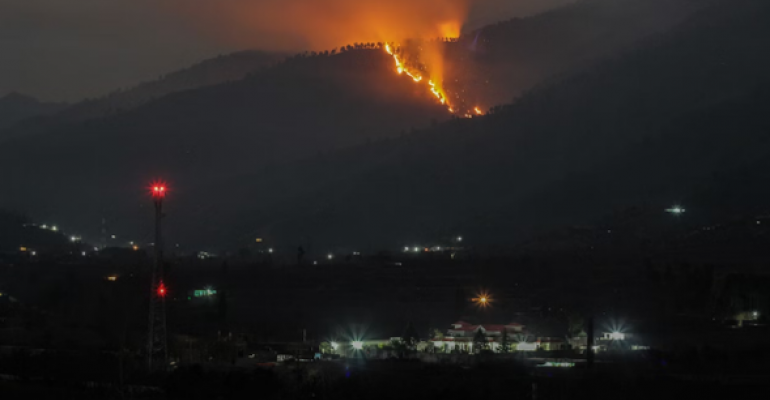
Strange Fire
This is one of those stories we tend to wish wasn’t there. It always comes with a jolt, and something of a sense of horror. The burning up of Nadab and Abihu feels shockingly disproportionate to us; and there is the terrible pathos of Aaron holding his peace – a silence that only breaks at the end of the chapter with his anguished cry to Moses, “Such things as these have happened to me!” It reads like a story without mercy; a story dominated by a capricious God rather than a tender Father.
Reading backwards in the story helps explain it in some measure. The tabernacle, the epicenter of true worship of the one true God, has just been erected, and filled with the smoking glory of God (Exodus 40). Moses then receives detailed instructions about sacrifices which are to be made at the tabernacle – sacrifices that represent the holiness of God, the means by which a holy God might be reconciled to his sinful people, and the manner in which those people will be identified as the holy God’s holy and set-apart people. This culminates with the consecration of Aaron and his sons as priests who will be the bridge between heaven and earth, as they minister in the tabernacle on behalf of the people, in service of YHWH (Leviticus 8). Aaron then offers a sacrifice to the Lord, to “make atonement for yourself and for the people” (Lev. 9:8), a sacrifice that is consumed by fire from YHWH (Lev. 9.24).
This is the very beginning of a whole new chapter in God’s dealing with man. The existence of the tabernacle, of priests, and of sacrifice, means that Israel has at her heart the visible, physically, worked out means of knowing peace with God. The tabernacle, the priests and the sacrifice are the bridge to life, but also mark the standard of perfection required by God of his people. The tabernacle, priests and sacrifice are at once liberating and terrifying.
Which is why when Nadab and Abihu decide to take matters into their own hands and offer ‘strange fire’ it is not merely a case of misguided enthusiasm, but an act of rebellion against YHWH himself – an act of rebellion that must be stopped in its tracks. Where before the sacrifice had smouldered, now the priests themselves burn.
It is a terrifying story, and reading backwards helps explain it, but so does reading forwards, because in Acts 5 we find a close parallel.
In the early chapters of Acts the people of God are once more constituted and defined, not this time by a tabernacle and priests and sacrifice, but by the once-for-all sacrifice of Christ and the outpouring of the Holy Spirit. Just as tabernacle worship identified the people of Israel in Sinai, now the presence and activity of the Spirit in his people identifies the Church in the world. Miracles, boldness in witness, and incredible generosity are the fruit of the Spirit’s work. Against this background, the decision on the part of Ananias and Sapphira to offer their own ‘strange fire’ by lying to the apostles, the church and (most significantly) the Spirit is an act of rebellion that must be stopped in its tracks. So Ananias and Sapphira, just like Nadab and Abihu, pay the price for their rebellion.
Both sets of deaths appear harsh to readers from late modernity, but seen in context their appropriateness is plain. In both cases, God’s nascent community is under threat. External threats will come aplenty, but internal ones are far more insidious, and potentially more destructive. The deaths of Nadab and Abihu, Ananias and Sapphira, demonstrate the absolute seriousness with which God watches over his people, and the absolute holiness of his name.
When we read Leviticus 10 it can seem that God is capricious, but when we read on in Acts 5 we see that he is in fact a tender Father. He is a Father who defends his holiness and his people, in order that his grace may be made known to the world. Immediately following the deaths of Ananias and Sapphira we read that,
Now many signs and wonders were regularly done among the people by the hands of the apostles. And they were all together in Solomon’s Portico. None of the rest dared join them, but the people held them in high esteem. And more than ever believers were added to the Lord, multitudes of both men and women, so that they even carried out the sick into the streets and laid them on cots and mats, that as Peter came by at least his shadow might fall on some of them. The people also gathered from the towns around Jerusalem, bringing the sick and those afflicted with unclean spirits, and they were all healed. (Acts 5:12-16)
In his mercy the Lord stops strange fire in its tracks, in order that the sick may be healed and signs and wonders performed. To which our glad response must, surely, be, your kingdom come, your will be done, Lord, on earth, as it is in heaven!